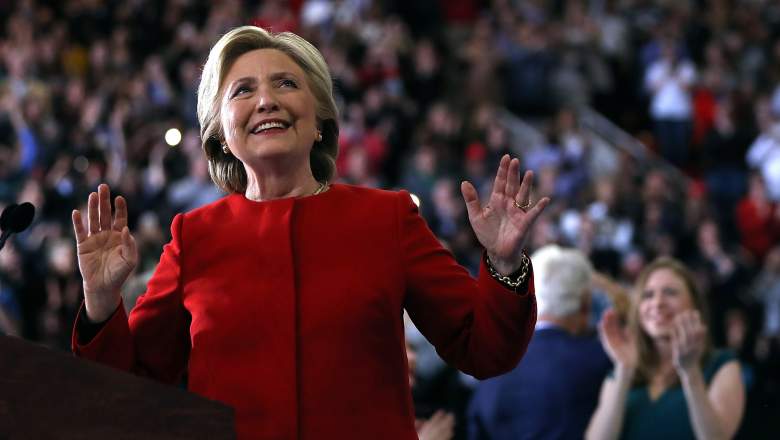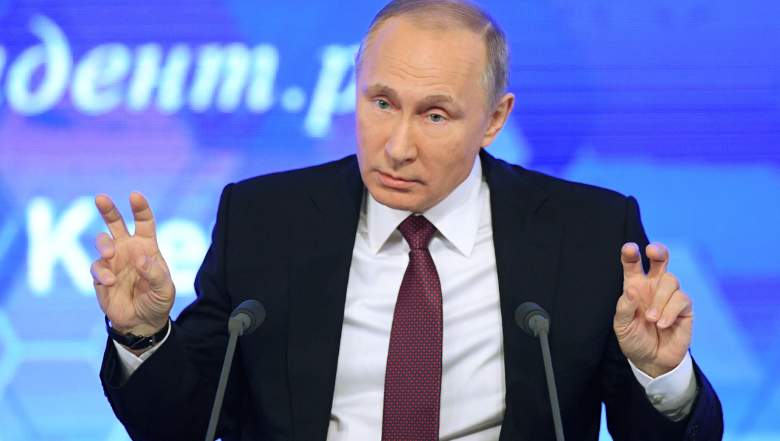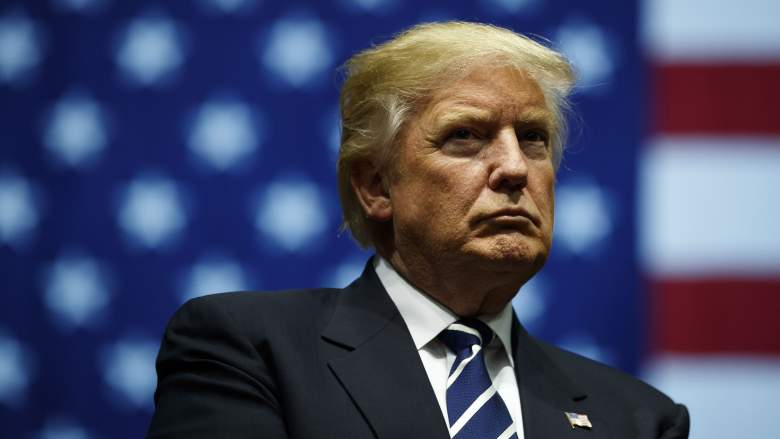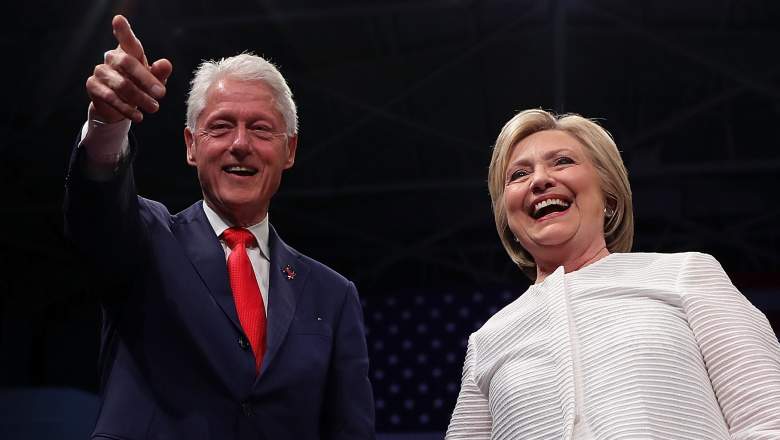
Bill and Hillary Clinton in 2016. (Getty)
President Donald Trump attempted to throw attention toward Bill and Hillary Clinton and Russia – specifically a supposed uranium deal.
Trump, under repeated fire for his own campaign’s alleged ties to Russia, wrote on March 27, “Why isn’t the House Intelligence Committee looking into the Bill & Hillary deal that allowed big Uranium to go to Russia, Russian speech….”
What is Trump talking about? Did Bill and Hillary Clinton make a deal that “allowed big Uranium” to go to Russia?
It’s not a new claim by Trump, as it turns out.
Here’s what you need to know:
1. The Claim Dates to a Clinton Foundation Donor Named Frank Giustra

Hillary Clinton. (Getty)
The Washington Post wrote an exhaustive article about the uranium question when Trump raised it during the presidential campaign.
The Post reported that the claim derived from a book called Clinton Cash and a New York Times article about that book.
According to The Washington Post, the players involved were “Frank Giustra, a Canadian mining financier and donor to the Clinton Foundation; Giustra’s company, UrAsia; and Uranium One, a uranium mining company headquartered in Toronto.”
Factcheck.org reported on the same 2015 New York Times story that recounted “how the Clinton Foundation had received millions in donations from investors in Uranium One, a Canadian-based company that sold a controlling stake in 2010 to Rosatom, the Russian nuclear energy agency, in a deal that had to be approved by the U.S. government.”
The site reported that the Clinton Foundation did not disclose the donations “even though then-Secretary of State Hillary Clinton had an agreement with the White House that the foundation would disclose all contributors.”
The Clinton Foundation acknowledged “we made mistakes, as many organizations of our size do, but we are acting quickly to remedy them.”
The New York Times story had reported: “As the Russians gradually assumed control of Uranium One in three separate transactions from 2009 to 2013, Canadian records show, a flow of cash made its way to the Clinton Foundation. Uranium One’s chairman used his family foundation to make four donations totaling $2.35 million.”
2. Russia Bought a Controlling Stake in Uranium One

Russian President Vladimir Putin. (Getty)
Politifact also conducted a detailed review of the Trump-Clinton uranium claims.
According to the site, “Russia’s nuclear energy agency, which also builds nuclear weapons, bought a controlling stake in Uranium One. The company has mines, mills and tracts of land in Wyoming, Utah and other U.S. states equal to about 20 percent of U.S. uranium production capacity.”
The New York Times reported in 2015 that Russian President Vladimir Putin crowed about the deal, with a Pravda newspaper headline trumpeting: “Russian Nuclear Energy Conquers the World.”
According to The Times, “The deal made Rosatom one of the world’s largest uranium producers and brought Mr. Putin closer to his goal of controlling much of the global uranium supply chain.”
3. The State Department Signed Off on the Deal but Hillary Clinton Wasn’t Involved, Her Campaign Contended

Hillary Clinton. (Getty)
The Washington Post reports that the State Department was involved.
“The State Department was one of nine agencies comprising CFIUS, which vets potential national security impacts of transactions where a foreign government gains control of a U.S. company,” The Post wrote.
The Post noted that Clinton’s campaign said “Clinton herself was not involved in the State Department’s review and did not direct the department to take any position on the sale of Uranium One.”
However, the New York Times article, from 2015, noted, “Shortly after the Russians announced their intention to acquire a majority stake in Uranium One, Mr. Clinton received $500,000 for a Moscow speech from a Russian investment bank with links to the Kremlin that was promoting Uranium One stock.”
4.Donald Trump Claimed During the Campaign That Hillary Clinton Gave 20 Percent of America’s Uranium to Russia

Donald Trump.(Getty)
During the 2016 presidential campaign, Trump lodged the uranium accusation during a campaign rally.
According to Politifact, Trump said that Hillary Clinton “gave up 20 percent of America’s uranium supply to Russia — to Russia.”
Politifact ranked the claim “mostly false” because there was no evidence of a quid pro quo. According to Politifact, “The State Department did approve the Uranium One deal, but it didn’t act unilaterally. It was one of nine U.S. government agencies, plus independent federal and state nuclear regulators, that had to sign off on the deal.”
Factcheck.org reported that Trump falsely tried to characterize the uranium deal as a pay for play scheme by Hillary Clinton.
“In a TV ad, Donald Trump falsely claims that Hillary Clinton ‘handed over American uranium rights to the Russians’ as part of a ‘pay-to-play’ scheme to get ‘filthy rich.’ Clinton did not have the authority to unilaterally approve that deal,” Factcheck.org reported.
The New York Times story reported that Clinton’s campaign had “emphasized that multiple United States agencies, as well as the Canadian government, had signed off on the deal and that, in general, such matters were handled at a level below the secretary.”
5. The Claim originated From a Conservative Author & Subsequent Article in the New York Times

Bill and Hillary Clinton. (Getty)
According to Fact Check.org, the uranium deal claim derives from the book “Clinton Cash: The Untold Story of How and Why Foreign Governments and Businesses Helped Make Bill and Hillary Rich,” which was written by Peter Schweizer, “a former fellow at a conservative think tank.”
The New York Times then wrote the follow-up investigative article in 2015 headlined, “Cash Flowed to Clinton Foundation Amid Russian Uranium Deal.”
The Times found that “whether the donations played any role in the approval of the uranium deal is unknown” but said the donations and deal raised ethical challenges.